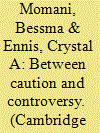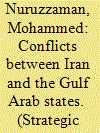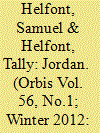|
|
|
Sort Order |
|
|
|
Items / Page
|
|
|
|
|
|
|
| Srl | Item |
| 1 |
ID:
118661


|
|
|
|
|
| Publication |
2012.
|
| Summary/Abstract |
The history of Gulf donorship, its trajectory and underlying motivations, continues to be an understudied aspect of foreign aid. While the Gulf Arab states are not new donors, their manner of regional coordination, branding, and aid management are distinct. Often helping fellow countries of the South, particularly Arab and Muslim countries, these countries have moved towards stronger private sector involvement and into social spending programmes. Owing to their oil wealth, Gulf Arab states' are increasingly generous and yet they are also cautious after 9/11 about how and by whom their aid is channelled. Nevertheless, with oscillations in oil prices, continued controversy over rising Islamism post-Arab-Spring, the future of Gulf aid remains a valuable subject of study.
|
|
|
|
|
|
|
|
|
|
|
|
|
|
|
|
| 2 |
ID:
114339


|
|
|
|
|
| Publication |
2012.
|
| Summary/Abstract |
The post-2003 Persian Gulf sub-region has witnessed intensified geopolitical conflicts and competition between Iran and the Gulf Arab states, particularly between Iran and Saudi Arabia. Scholars and experts have mostly analysed the conflicts through political and strategic prisms while neglecting their economic dimensions. This article analyses the various post-2003 conflicts between Iran and the Gulf Arab states with a focus on how economic integration or the lack thereof creates the incentives to resolve or sustain the conflicts. It concludes that low levels of trade and economic integration and the absence of an economics of cooperation between Iran and its Gulf Arab neighbours inhibit any strong initiatives to resolve the conflicts.
|
|
|
|
|
|
|
|
|
|
|
|
|
|
|
|
| 3 |
ID:
110160


|
|
|
|
|
| Publication |
2012.
|
| Summary/Abstract |
The Arab Spring has fundamentally shifted the strategic balance in the Middle East. As all sides rush to ensure that their interests will be secured, the Hashemite Kingdom of Jordan has emerged as a key battleground between those who would like to see a more democratic region, and those who would like to maintain economic stability. On one side of this debate is the Gulf Cooperation Council, led by Saudi Arabia, that views democratic reform as a threat to economic stability. On the other side are the forces of the Arab Spring, which have called for political reform in states such as Egypt, Syria, and Libya, even if these reforms come at the expense of stability. This article examines the various forces, both domestic and international, that are attempting to influence Jordan, and through it, the balance of power in the Arab World.
The uprisings in the Arab world have not only upended domestic politics in individual states where protests have taken place, they have also served as a catalyst for transforming international relations in the Middle East. The Arab Spring has sent policymakers on all sides scrambling to ensure that the new regional order will be in line with their interests. The regimes that fell in Egypt and Tunisia were pillars of a moderate Sunni bloc that was allied with the United States and felt threatened by both Iran's bid for regional hegemony as well as Islamist and/or democratic reform movements domestically. The leaders of this moderate Sunni bloc, which also includes Saudi Arabia, the Gulf States, and Jordan, were alarmed by American support for the protest movements that ousted the Mubarak and Ben Ali regimes from Egypt and Tunisia respectively. The remaining states in this bloc have since circled their wagons, and are working to build a durable political/military alliance that is capable of withstanding the destabilizing trends associated with the Arab Spring.
However, unlike the wealthy Gulf Arab states, which now form the core of this truncated bloc, Jordan is poor and has always been more culturally and politically tied to the states of the Mediterranean Basin. Thus, the pull of the Arab Spring, which engulfed Egypt, Syria, and other Mediterranean states, has been much stronger in Jordan than it has in most of the Gulf Arab States (the major exception being Bahrain). Jordan, therefore, finds itself caught between two competing forces. On one side are the Sunni Monarchies of the Gulf, which wish to maintain regional economic and political stability and have attempted to bolster the Jordanian regime by recently inviting it to join the Gulf Cooperation Council (GCC). The other side presents pressures of political reform associated with the Arab Spring that have spread throughout the Mediterranean Basin. As an unexpected result, the small Arab Kingdom of Jordan has become a strategic battleground between those who want to see a more democratic region, and those who want to maintain the status quo. Nevertheless, the domestic politics of Jordan will undoubtedly decide in which direction Jordan heads. Political divisions inside Jordan have thus suddenly become very important to the future of the whole region.
|
|
|
|
|
|
|
|
|
|
|
|
|
|
|
|
| 4 |
ID:
179795


|
|
|
|
|
| Summary/Abstract |
This study traces the modern origins of the Kafala migrant labour sponsorship system in the Gulf Arab States. The sponsorship system was a product of the British colonial era, particularly the period from the 1920s until independence in the 1970s. Colonial administrators introduced sponsorship requirements in order to control labour migration in the pearl industry shortly before the discovery of oil in the region, and its use was further regularized and widely applied with the increasing migrant labour working in the oil companies. British officials viewed migrant labour as both a necessity and a problem that needed to be regulated and controlled, both from the viewpoint of economic growth and security. As jurisdiction over foreigners was retroceded back to the newly created states in the independence era, sponsorship of foreign labour was ultimately restricted and delegated to citizens or companies owned by citizens. As a particular example, the case of the ‘bachelor’ worker is detailed as a legal-bureaucratic complex of sponsorship practices. Such practices are placed within a wider ensemble of British colonial policies for controlling labour and policing empire across the Indian Ocean in the nineteenth and twentieth centuries.
|
|
|
|
|
|
|
|
|
|
|
|
|
|
|
|
| 5 |
ID:
086561


|
|
|
|
|
| Publication |
2009.
|
| Summary/Abstract |
This provides a detailed explanation of how the Indian Empire was organised and run. But its main purpose is to argue that the British Indian Empire was in fact much larger than historians of the Raj normally realise because the Empire should be taken to include the Gulf Arab states, Bhutan, Nepal, Afghanistan, the Aden Protectorate and the British Somaliland protectorate.
|
|
|
|
|
|
|
|
|
|
|
|
|
|
|
|
|
|
|
|
|